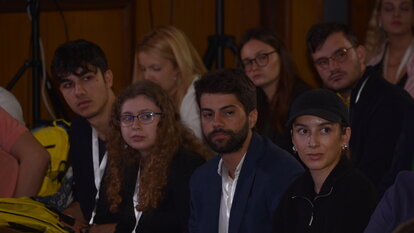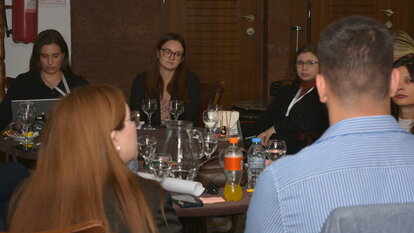YOUTH EMPOWERMENT
21st International Youth Conference
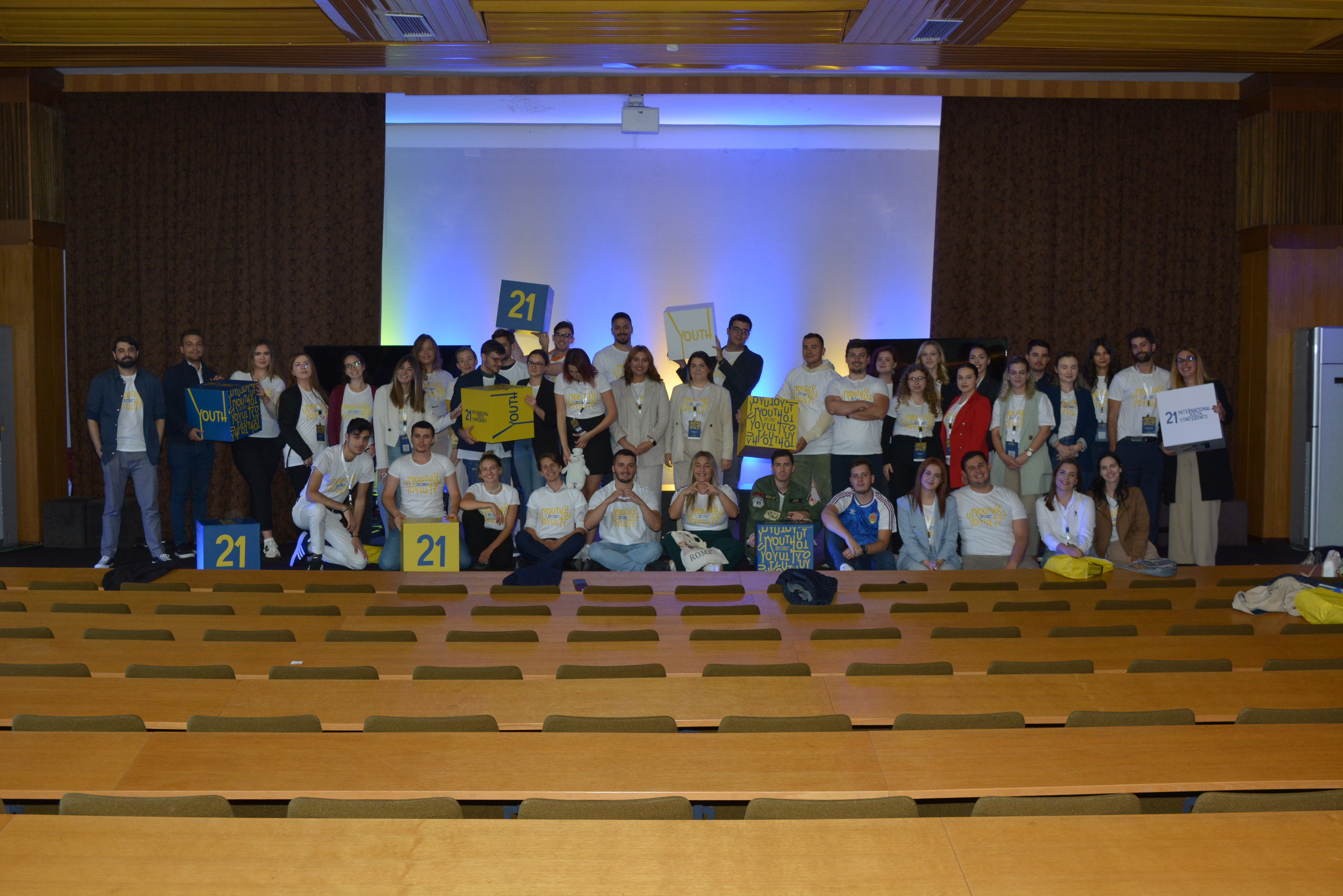
From the 5th to the 9th of October a group of young leaders from 14 countries participated in the 21st edition of the International Youth Conference "European values for the Future of SEE Countries" in Krusevo organized by Youth Alliance, with the support of the Federal Foreign Office of Germany and the Friedrich Naumann Foundation for Freedom.
The 21st IYC in North Macedonia was a unique opportunity to exchange views and ideas on current issues that concern the region, the exploration of cooperation perspectives, and the resolution of chronic pathologies through Civil Society. The aim was to achieve this by adopting a "bottom-up" approach, in response to the rigidity of state mechanisms and the frequent lack of political will from the region's leadership to take "bold" initiatives.
During the opening ceremony, Mr Metodija Stojcheski, Executive director of Youth Alliance Krusevo, Mr Otto Graf, Deputy Head of Mission of the German Embassy and Ms Eleni Siapikoudi, Project Assistant at Friedrich Naumann Foundation for Freedom for Greece and Cyprus welcomed the participants. In their initial remarks they referred on the meaning and importance of youth exchange and regional cooperation, the peculiarities of the region and their vision regarding the future of SEE Countries. Lastly, they emphasized on the crucial and experienced work that Youth Alliance is doing through these conferences and the need for more civil society interactions.
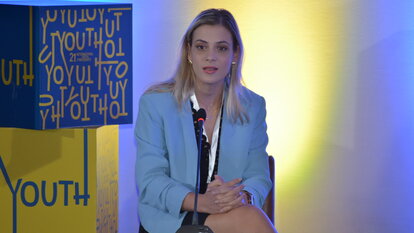
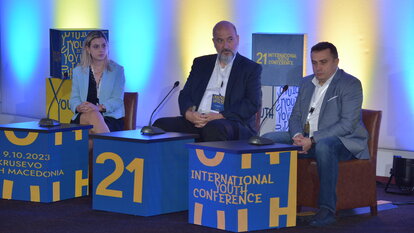
Day I: Free-range Corruption or Not? Unraveling the impact of corruption on social cohesion and trust in the Western Balkans
The first day of the conference focused on corruption. In the first session Real talk on Free-range corruption or not? Uncovering the impact of corruption on cohesion and trust in the Western Balkans, experts on corruption and transparency issues shared their insights and perspectives. They also discussed corruption in the region and ways to fight it with young people who had the opportunity to be on the panel.
In particular, Ms Aneta Arnaudovska, RAI's anti-corruption expert, underlined the importance and invited the audience to believe in youth organizations fighting corruption. Ms Françeska Muço, Secretary General of the Network of Young Professionals, spoke about the poor democratic culture rooted in political corruption and called on us to continue to be resilient and persistent in our fight against corruption. Ms Biljana Dukovska, President of the Macedonian Platform Against Poverty - gave further insights into the relationship between poverty and corruption. In particular, she highlighted the poor state of the health system, which is reflected in the fact that to receive basic treatment you have to pay or know someone in the system. Finally, thanks to the intervention of Mr Mirza Softić, an independent journalist, the fight against corruption from below was discussed and a debate was opened on the role of young people in the fight against corruption. The Real Talk session ended with the audience being invited to question the experts and express their opinions and concerns.
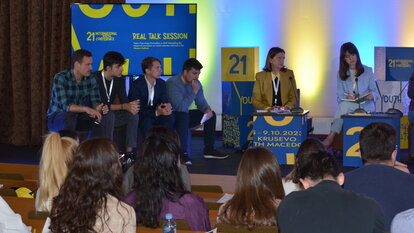
Then, in the Drop the Mic session on Nature vs Nurture of Corruption: role of Individual Dispositions and Societal Factors participants examined the influence of human nature, upbringing, and societal norms on corruption. The discussion was particularly productive as the young people were given the opportunity to develop an argument based on examples from their own daily lives. In this context, the emphasis was on the strengthening of education as a way to increase transparency. Ultimately, most participants concluded that corruption is an act of individual predisposition and the result of social factors.
Day II: Youth Pressing Forward: Harnessing Gen Z agency in the media landscape to shape new narratives in the WB6
The panel consisted of Kristina Atovska, journalist and war correspondent, Eva Hasel, writer specializing in history and politics, Marija Todorovic, editor and culture manager at the independent Serbian magazine Oblakoder, and finally, Arber Gashi, founder of the online Balkanism page.
Kristina Atovska focused on how important is for journalists to convey their message accurately, comparing her profession to an art form, recalling the dangers of distortion in the age of social media. Eva Hasel continued by emphasizing the dual role of digital media, characterizing it as a "lifeline" but also as a potential source of misunderstandings in cases involving sensitive historical and cultural issues. Marija Todorovic emphasized the role of young people and the need for greater representation of them in the traditional media. Finally, Arber Gashi, shared his own experience, highlighting how social media have affected young people. In fact, he mentioned examples where through his page they managed to build "trans-Balkan bridges" between young people in the region, overcoming national stereotypes and prejudices.
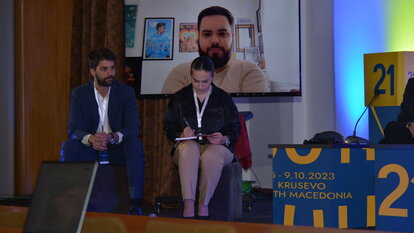
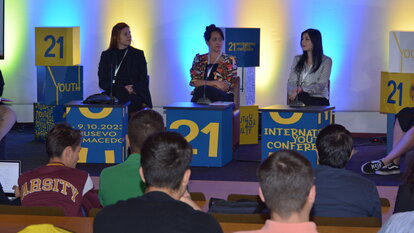
“I was particularly impressed by the dynamic participation of all the delegates, as it was followed by a lengthy Q&A session where concerns were expressed about the role of Artificial Intelligence and algorithms when using social media. The phenomenon of "cancel culture" on the internet also caused particular interest in the discussion, with the participants expressing different perspectives regarding its dimensions and limits, as well as potential consequences for freedom of expression.”
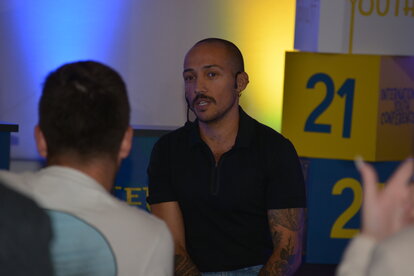
Day III: Sustainable Footprints – The balancing act within the EU-WB6 Sustainability Alliance- Collaboration, Competition, or Compromise
The third and final Real Talk session of the conference which took place in Krusevo, brought together experts, policymakers, and young individuals passionate about tackling challenging topics such as sustainability in the Balkans. The seminar focused on various environmental issues that the region has been facing unremittingly, and participants, from the stage and audience, later addressed and tried to provide a set of opportunities or solutions accordingly.
The meeting discussions centered on the region's vulnerability to extreme weather events and the need for adaptation strategies, so the importance of mitigating greenhouse gas emissions through clean energy sources was considered. Promoting cross-border energy cooperation and relations emerged as a critical theme throughout the session, given the shared rivers and energy resources in the Balkans, therefore common potential. Participants discussed the benefits of collaborative projects like interconnectors and shared energy grids; as such initiatives can enhance energy security and foster sustainable energy practices.
The session also delved into concerns about high levels of air pollution in Balkan cities, such as the historical use of coal, which raised significant environmental and health concerns as talks revolved around the lack of cleaner and more energy-efficient sources along with the absence of support for affected communities. The necessity of thorough environmental impact assessments for infrastructure projects was underscored, with a call for these assessments to be mandatory. Participants stressed the importance of comprehensive pollution control measures, particularly given the region's heavy reliance on coal. Proposed solutions included stricter emissions controls and increased investment in public transportation.
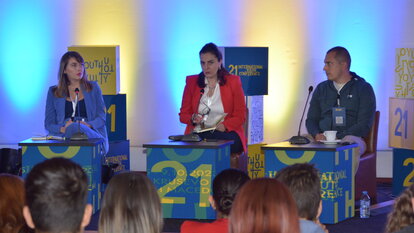
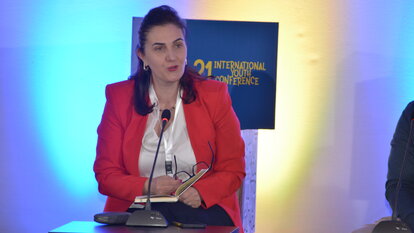
In addition, it was mentioned that many Balkan cities grapple with waste management challenges, including inefficient disposal, limited recycling infrastructure, and high levels of littering, contributing to environmental pollution. Water management issues such as scarcity, pollution, and outdated infrastructure also affect the region, emphasizing the need for clean and efficient water practices, therefore proper waste and water management were highlighted as crucial for environmental improvement.
Finally, conservation education emerged as a vital tool for raising awareness and promoting sustainable practices. Participants advocated for its integration into school curriculum and community programs. Green technology innovation was also debated as a means to reduce environmental impact, with a focus on research and development in eco-friendly technologies. Energy efficiency and storage were identified as one of the key fields in minimizing environmental impact, with proposed measures including incentives for efficiency improvements and investments in advanced energy storage infrastructure.
During the sessions, participants were divided into groups for the Unconference space session, entitled Weaving the Real Conversations Together. In this context, they had the opportunity to discuss the integration of the Western Balkans. Under the guidance of the organizers, the main focus was on the identification of the problems that plague their integration. At the same time, participants from EU member states had the opportunity to talk about their own experiences as European citizens, as well as the problems that are still an obstacle on their European path. Beyond the importance of the topic, the session was an opportunity to share our experiences, discover the common path of states, past mistakes, and how to overcome them through dialogue and strengthening young people's participation in such initiatives.
This article has been prepared by the Greek delegation at the 21st International Youth Conference in Krusevo with the title “European values for the Future of SEE Countries". The delegation consisted of Ioannis Alexandris, Taxiarxis Kornezos, Eleni Patlaka and Eleni Siapikoudi.
